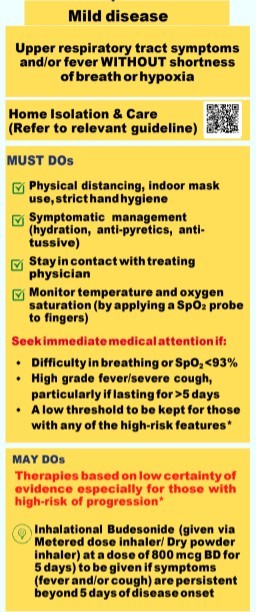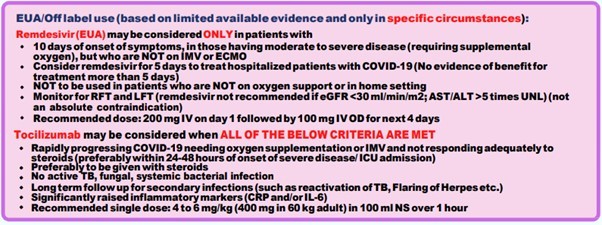New 'amended' COVID treatment guidelines by ICMR/MoHFW
M3 India Newsdesk Jan 25, 2022
The recommendations for treating mild, moderate, and severe COVID-19 patients have been amended by the Union Ministry of Health. AIIMS, ICMR - COVID-19 National Task Force, and Joint Monitoring Group (DGHS) under the Union Health Ministry have produced recommendations for the care of adult COVID-19 patients which have been listed in this article.
Guidelines for adult COVID-19 patients with mild symptoms
- Mild COVID-19 symptoms include upper respiratory tract symptoms or fever without shortness of breath.
- Home isolation, physical separation, indoor mask usage, and temperature and oxygen saturation monitoring are all must-dos.
- Patients should be advised to reach out for help if they have trouble breathing, or their SpO2 drops below 93 per cent and they have a high-grade fever or a severe cough lasting longer than five days.
May be applicable- If symptoms (fever or cough) continue beyond five days from the commencement of the illness, inhalational Budesonide (at a dosage of 800 mcg BD for five days) should be administered.

Guidelines for adult COVID-19 patients with moderate symptoms
COVID-19 moderate symptoms include:
- Breathlessness
- Respiratory rate of less than or equal to 24 per minute
- SpO2 level of 90 to 93 per cent
Consider the following:
- All patients who need supplementary oxygen treatment should prone when awake.
- Methylprednisolone 0.5 to 1 mg/kg in two split doses (or an equivalent dosage of dexamethasone) for 5 to 10 days is commonly prescribed.
- There is little evidence that injectable steroids are beneficial in people who do not need oxygen support or who continue after discharge.
- When anti-inflammatory or immunomodulatory medication (such as steroids) is administered too early, at a greater dosage, or for longer than necessary, there is a risk of secondary infection, such as invasive mucormycosis.
- Unfractionated heparin or low molecular weight heparin (weight-based, e.g. enoxaparin 0.5 mg/kg per day SC) as a preventive dosage. There should be no contraindications to the procedure or a significant risk of bleeding.

Guidelines for adult COVID-19 patients with severe symptoms
Patients with severe COVID symptoms have a respiratory rate of less than 30 minutes per minute, dyspnoea, and an oxygen level of less than 90% on room air.
Anti-inflammatory or immunomodulatory therapy:
- Methylprednisolone 1 to 2 mg/kg IV in two separate doses (or an equivalent amount of dexamethasone) is commonly given for 5 to 10 days as an anti-inflammatory or immunomodulatory treatment.
- When steroids are administered too early, at a greater dosage, or for longer than the recommended duration, they might cause secondary infections like black fungus.
- Clinical follow-up when the patient has effort breathing, haemodynamic instability, and changes in oxygen demand.
- CXR should be done on a regular basis; HRCT chest should only be done if the condition worsens.
- CRP, D-dimer, and blood sugar 48 to 72 hours; CBC, KFT, and LFT 24 to 48 hours.

Administering Remdesivir
- Administer within 10 days after the beginning of symptoms in patients with moderate to severe illnesses (requiring supplementary oxygen) who are not on IMV or ECMO.
- If you're treating a hospitalised patient with COVID-19, consider using remdesivir for five days (No evidence of benefit for treatment more than five days).
- It is not to be used in patients who aren't on oxygen or at home.
- Recommended dose: 200 mg IV on day 1, then 100 mg IV OD for the following four days.
Administering Tocilizumab
Tocilizumab should only be explored in the following situations:
- Rapidly worsening COVID-19 requiring oxygen or IMV and not responding satisfactorily to steroids (ideally within 24-48 hours of the beginning of severe disease/ICU admission).
- It's best if it's administered alongside steroids.
- No current TB, fungal, or bacterial infection in the system.
- Follow-up for secondary infections over a long period of time (such as reactivation of TB, flaring of Herpes, etc).
- Recommended dose: A single dosage of 4 to 6 mg/kg (400 mg in a 60 kg adult) in 100 ml NS over one hour is recommended.
Ivermectin, favipiravir, and doxycycline are not recommended in the most recent recommendations. Antiviral medications such as molnupiravir and monoclonal antibodies are also excluded from the recommendations.
Disclaimer- The views and opinions expressed in this article are those of the author's and do not necessarily reflect the official policy or position of M3 India.
The author is a practising super specialist from New Delhi.
-
Exclusive Write-ups & Webinars by KOLs
-
Daily Quiz by specialty
-
Paid Market Research Surveys
-
Case discussions, News & Journals' summaries